Masters applications for 2023 entry are now closed.
Applications for September 2024 will open on Monday 25 September. Applications are now open for programmes with a January 2024 start. View our programmes »
| UCAS code |
|
| Duration |
1 year full time
2 years part time |
| Entry year |
September 2024 |
| Campus |
Streatham Campus
|
| Discipline |
Modern Languages and Cultures
|
| Contact |
|
Overview
- An interdisciplinary programme that will develop your intercultural awareness and competence, and give you an understanding of the theory and practice of intercultural communication, skills highly valued by employer in today’s global world.
- Develop an in-depth understanding of the complexities of communication in a globalised world, the ability to apply the acquired discipline specific skills to address challenges and implement positive and sustainable solutions, and the ability to conflate others’ perspectives to navigate complex relationships locally and globally.
- Tailor your programme to your interests and career ambitions with a range of optional modules from across the Department of Languages, Cultures and Visual Studies.
- Taught by experts in the field of intercultural communication, discourse analysis, language and globalisation, multilingualism and migration.
- Join a vibrant research community and develop your research skills through a series of structured practical seminars supporting you in the planning, design, implementation and presentation of your research.
- There are two other pathways available for the MA Intercultural Communication, depending on interest: International Business or Education
Top 150 in world subject rankings for Modern Languages
Top 10 in UK subject rankings for Modern Languages
Develop transferable skills, specialist knowledge and professional experience through interdisciplinary teaching
Entry requirements
We will consider applicants with a 2:2 Honours degree with 53% or above in their first degree in a relevant subject area. While we normally only consider applicants who meet this criteria, if you are coming from a different academic background which is equivalent to degree level, or have relevant work experience, we would welcome your application.
Entry requirements for international students
English language requirements
International students need to show they have the required level of English language to study this course. The required test scores for this course fall under Profile B2. Please visit our English language requirements page to view the required test scores and equivalencies from your country.
Fees
2024/25 entry
UK fees per year:
£12,000 full-time; £6,000 part-time
International fees per year:
£24,300 full-time; £12,150 part-time
Scholarships
We invest heavily in scholarships for talented prospective Masters students. This includes over £5 million in scholarships for international students, such as our Global Excellence Scholarships*.
For more information on scholarships, please visit our scholarships and bursaries page.
*Selected programmes only. Please see the Terms and Conditions for each scheme for further details.
Course content
Core modules explore key concepts, such as culture, identity, acculturation, prejudice and othering, issues, debates, and critical approaches to intercultural communication from a global perspective that goes beyond Eurocentric or western perspectives.
You will also develop your research competence and critical reflection on the process of planning, designing, implementing, and presenting of research in preparation for your dissertation.
In one of the optional modules, Sustainable Development Goals Challenge, you join a team of international students and address a real-life sustainable development goal challenge. This ground-breaking module will help you gain first-hand experience in intercultural interactions.
The modules we outline here provide examples of what you can expect to learn on this degree course based on recent academic teaching. The precise modules available to you in future years may vary depending on staff availability and research interests, new topics of study, timetabling and student demand.
90 credits of compulsory modules and 60 credits of pathway modules, 30 credits from optional modules
a Choose 60 credits from this list of compulsory choice modules
b Choose 30 credits of optional modules
Compulsory modules
| Code | Module |
Credits |
|---|
| SMLM087 |
Intercultural Communication: Key Concepts and Theories | 30 |
| SMLM088 |
Dissertation | 60 |
| SMLM089 |
Language and Globalisation [See note a above] | 15 |
| SMLM090 |
Minority Languages: Maintenance, Revitalisation and Endangerment [See note a above] | 15 |
| SMLM091 |
Language, Discourse and Society [See note a above] | 15 |
| SML3043 |
Migration and Multilingualism [See note a above] | 15 |
| SMLM059 |
Language, Ethnography and Mobility [See note a above] | 15 |
Optional modules
| Code | Module |
Credits |
|---|
| BEP3172 |
Future 17: Sustainable Development Goals Challenge [See note b above] | 15 |
| EFPM292 |
Bilingual and Multilingual Perspectives on Language Learning and Teaching [See note b above] | 15 |
| EFPM912 |
Perspectives on International Education [See note b above] | 30 |
| EFPM375 |
Education for diversity [See note b above] | 30 |
| EFPM313 |
Issues in English Language Teaching [See note b above] | 15 |
| CMMM005 |
Social Media and Migration [See note b above] | 30 |

Professor Francesco Goglia
Associate Professor of Migration and Multilingualism

Dr Susana Afonso
Senior Lecturer in Portuguese

Dr Birgül Yilmaz
Senior Lecturer in Intercultural Communication
Professor Francesco Goglia
Associate Professor of Migration and Multilingualism
Professor Goglia’s teaching reflects his research interests in multilingualism. He’s always keen to share his findings with his students and encourage them to share their experiences of multilingualism both in seminar discussions and assessments.
In 2021, he was awarded a Community-Engaged Incubator: Students as Teachers of Multilingualism: a Bi-Directional Project between the University of Exeter and Rokeby School, a secondary school in the borough of Newham in East London. This pilot project tested an innovative method of community-engaged learning on multilingualism and linguistic diversity, in which both student cohorts were engaged in online teaching and learning activities.
He's also a member of the Society of Italian Studies Equality, Diversity and Inclusion working group, and a Fellow of the Higher Education Academy.
Profile page
Dr Susana Afonso
Senior Lecturer in Portuguese
Dr Afonso convenes modules mainly on language variation and change, including contact between languages (mainly involving Portuguese), an area of her academic research. She also convenes a module on the relationship between language, culture and the mind, inspired by cognitive linguistics.
She is a fellow of the Higher Education Academy.
Profile page
Dr Birgül Yilmaz
Senior Lecturer in Intercultural Communication
Dr Birgül Yılmaz is a Senior Lecturer in Intercultural Communication. She leads the core module of SMLM087 and SMLM088 on the MA in Intercultural Communication and creates optional modules based on her over a decade long ethnographic fieldwork gained internationally.
Dr Yılmaz is a Critical Sociolinguist and Applied Linguist, specialising in the areas of sociolinguistics of forced migration, humanitarianism, ethnography, critical/ discourse analysis, interactional sociolinguistics, and linguistic practice in institutional and precarious settings such as refugee camps. Her teaching is social justice oriented and builds awareness on everyday intercultural communicative inequalities.
She is a member of the International Association for Languages and Intercultural Communication (IALIC), the British Association for Applied Linguistics (BAAL), the American Association for Applied Linguistics (AAAL), and the Linguistic Ethnography Forum (LEF).
Dr Yılmaz is an Associate Editor for Glossa Contact. Her research in two refugee camps on Lesbos Island appeared on BBC Radio 3's Free Thinking programme: What language did Columbus speak?
Modules she convenes are:
Profile page
Teaching and research
You will be taught by experts in the field of intercultural communication, discourse analysis, language and globalisation, multilingualism and migration. You will learn collaboratively with other students and the wider postgraduate research community.
Research in Modern Languages and Cultures is characterised by world-leading and internationally excellent research centres, which span a wide range of sub-disciplinary fields including:
Careers
Employer-valued skills
You will be equipped with skills highly valued by employers such as communication in a multicultural environment, understanding the complexities of communication in a globalised world, analytical and presentation skills, critical thinking and research-oriented skills, including planning skills and time management. You will also have a solid foundation in research and work in the field of migration.
Careers
Professionals with the ability to work in diverse cultural and linguistic settings are required in a range of organisations. Career paths include NGOs, international development, refugee centres, government institutions which deal with migrants and asylum seekers, multilingual schools, and universities. You could also pursue roles within the British Government and other corresponding national bodies including consultancy, immigration, and asylum. Alternatively, you may undertake PhD research and an academic career.
















